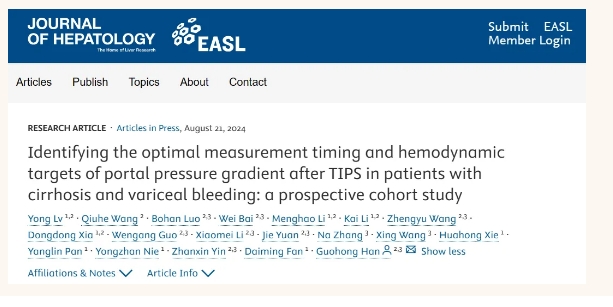Transjugular intrahepatic portal shunt (TIPS) is internationally recognized as one of the most effective treatment and prevention methods for portal hypertension. However, there has not been a widely accepted standard for how much TIPS pressure gradient can be reduced. Currently, the pressure gradient proposed by European scholars in 1998 using bare stents is still less than 12mmHg or reduced by more than 50% of baseline. Under this standard, although it can reduce pressure and solve the problem of variceal bleeding, the challenge it brings is that the incidence of postoperative hepatic encephalopathy is between 20% and 50%, especially in the era of TIPS covered stents. The standard from the bare stent period is still used, which is far from meeting the current clinical needs.
What is the ideal range of pressure gradient for TIPS coated stents, which have been available for 20 years and widely used in China for nearly a decade? The so-called ideal range: can it reduce portal pressure to the greatest extent possible to solve the problem of variceal bleeding, while also reducing the occurrence of hepatic encephalopathy? In the process of searching for this answer, we found that when to measure portal vein pressure gradient (PPG) is more indicative of patient prognosis? It is also an urgent question that needs to be answered.
Recently, Professor Han Guohong's team from the Digestive Disease Hospital of Xi'an International Medical Center Hospital published a study in the Journal of Hepatology (1st District, Chinese Academy of Sciences, IF=26.8) exploring the optimal measurement time and hemodynamic range of PPG after TIPS with covered stents in patients with liver cirrhosis and variceal bleeding.

Research has shown that PPG measured immediately after TIPS is not accurate enough due to various factors such as anesthesia and medication, and therefore cannot truly reflect the patient's prognosis. PPG measured before discharge after TIPS surgery (early PPG) can more accurately predict the risk of complications. Especially setting the early PPG target at 11-14 mmHg or TIPS and reducing it by 20% -50% relative to baseline can effectively balance the risk of portal hypertension complications and hepatic encephalopathy, providing important guidance for the creation and revision of TIPS guidelines.
This study lasted for seven years, from improving the conditions for pressure measurement, developing project design, and registering the protocol to enrolling patients, collecting and improving clinical data, following up with patients, conducting statistical analysis, and finally publishing the article. During the follow-up of each patient, team members actively overcame every difficulty and honed their skills over the course of seven years! Finally, TIPS related research results were published again in the top international journal in the field of liver disease.
Professor Han Guohong's team has been dedicated to the clinical and research work of interventional therapy for portal hypertension (portal thrombosis and/or cavernous degeneration, variceal bleeding and ascites, Budd Chiari syndrome, etc.) and interventional combined target immunotherapy for liver, gallbladder, and pancreatic tumors for more than 30 years. Regarding multiple research achievements on portal hypertension and liver cancer, the first or corresponding author has published 163 SCI papers in international authoritative journals such as Ann Oncol, Nat Rev Gastro Hepatol, Lancet Gastro Hepatol, Gastroenterology, J Hepatol, Gut, Radiology, Liver Cancer, Hepatology, etc. The highest single paper score is 56.7, with 24 papers scoring above 10 and 16 papers scoring 5-10 (5 selected as ESI highly cited papers and 2 ESI hot papers). He has been cited more than 8000 times and has an H-index of 48. The relevant achievements have been included in more than 10 international guidelines, including the American Society of Hepatology, the European Society of Hepatology, and the British Society of Gastroenterology (2014-2023).
